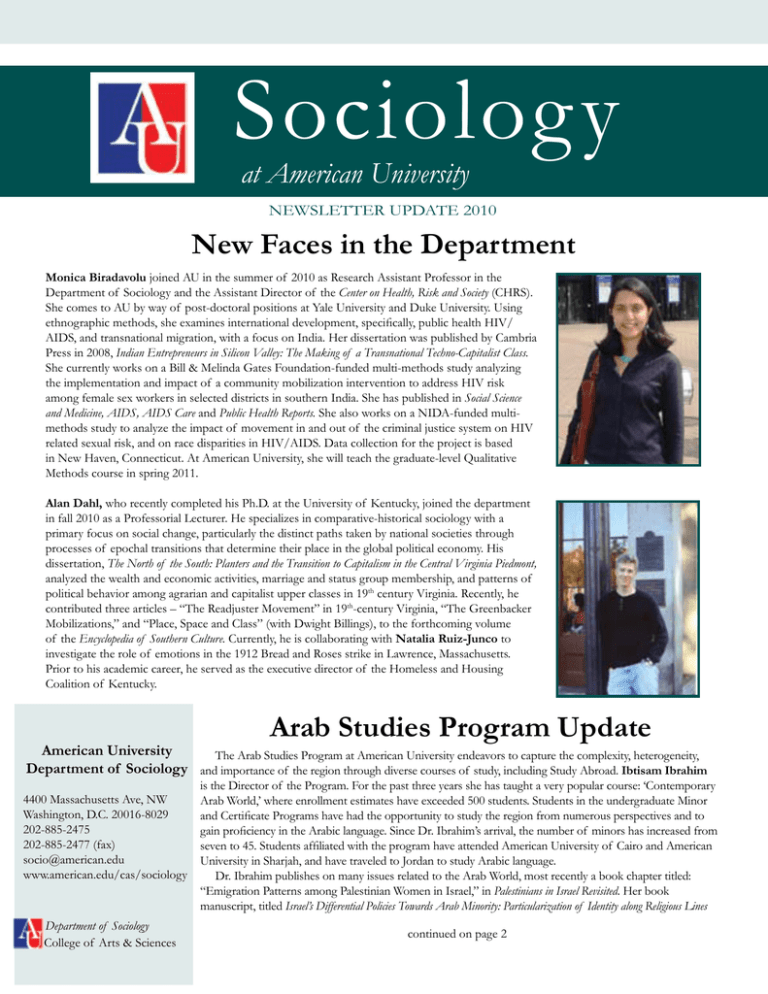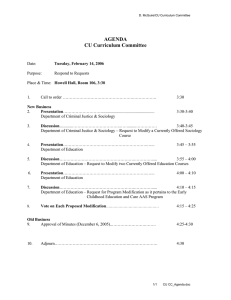Sociology at American University New Faces in the Department NEWSLETTER UPDATE 2010
advertisement

Sociology at American University NEWSLETTER UPDATE 2010 New Faces in the Department Monica Biradavolu joined AU in the summer of 2010 as Research Assistant Professor in the Department of Sociology and the Assistant Director of the Center on Health, Risk and Society (CHRS). She comes to AU by way of post-doctoral positions at Yale University and Duke University. Using ethnographic methods, she examines international development, specifically, public health HIV/ AIDS, and transnational migration, with a focus on India. Her dissertation was published by Cambria Press in 2008, Indian Entrepreneurs in Silicon Valley: The Making of a Transnational Techno-Capitalist Class. She currently works on a Bill & Melinda Gates Foundation-funded multi-methods study analyzing the implementation and impact of a community mobilization intervention to address HIV risk among female sex workers in selected districts in southern India. She has published in Social Science and Medicine, AIDS, AIDS Care and Public Health Reports. She also works on a NIDA-funded multimethods study to analyze the impact of movement in and out of the criminal justice system on HIV related sexual risk, and on race disparities in HIV/AIDS. Data collection for the project is based in New Haven, Connecticut. At American University, she will teach the graduate-level Qualitative Methods course in spring 2011. Alan Dahl, who recently completed his Ph.D. at the University of Kentucky, joined the department in fall 2010 as a Professorial Lecturer. He specializes in comparative-historical sociology with a primary focus on social change, particularly the distinct paths taken by national societies through processes of epochal transitions that determine their place in the global political economy. His dissertation, The North of the South: Planters and the Transition to Capitalism in the Central Virginia Piedmont, analyzed the wealth and economic activities, marriage and status group membership, and patterns of political behavior among agrarian and capitalist upper classes in 19th century Virginia. Recently, he contributed three articles – “The Readjuster Movement” in 19th-century Virginia, “The Greenbacker Mobilizations,” and “Place, Space and Class” (with Dwight Billings), to the forthcoming volume of the Encyclopedia of Southern Culture. Currently, he is collaborating with Natalia Ruiz-Junco to investigate the role of emotions in the 1912 Bread and Roses strike in Lawrence, Massachusetts. Prior to his academic career, he served as the executive director of the Homeless and Housing Coalition of Kentucky. Arab Studies Program Update American University The Arab Studies Program at American University endeavors to capture the complexity, heterogeneity, Department of Sociology and importance of the region through diverse courses of study, including Study Abroad. Ibtisam Ibrahim 4400 Massachusetts Ave, NW Washington, D.C. 20016-8029 202-885-2475 202-885-2477 (fax) socio@american.edu www.american.edu/cas/sociology Department of Sociology College of Arts & Sciences is the Director of the Program. For the past three years she has taught a very popular course: ‘Contemporary Arab World,’ where enrollment estimates have exceeded 500 students. Students in the undergraduate Minor and Certificate Programs have had the opportunity to study the region from numerous perspectives and to gain proficiency in the Arabic language. Since Dr. Ibrahim’s arrival, the number of minors has increased from seven to 45. Students affiliated with the program have attended American University of Cairo and American University in Sharjah, and have traveled to Jordan to study Arabic language. Dr. Ibrahim publishes on many issues related to the Arab World, most recently a book chapter titled: “Emigration Patterns among Palestinian Women in Israel,” in Palestinians in Israel Revisited. Her book manuscript, titled Israel’s Differential Policies Towards Arab Minority: Particularization of Identity along Religious Lines continued on page 2 2 Arab Sudies continued from page 1 in the City of Shafa-Amr, is under review with Florida University Press. In July 2010, she presented a talk titled: “Muslim Non-Violent Resistance: The Case of the Al-Aqsa Association for Islamic Restoration and Sanctities (AAAIRS) in Israel,” at the “World Congress for Middle Eastern Studies” in Barcelona, Spain. Errata In our 2010 newsletter editing, we mistakenly switched the majors of the two New Orleans student leaders for the New Orleans’ Alternative Break on HIV/AIDS. Amber Jolla is from the College of Arts and Sciences; Mobola Oyefule is from the School of International Studies. Sociology Launches Center on Health, Risk and Society The Center on Health, Risk and Society (CHRS) will build an interdisciplinary community of scholars at American University interested in conducting research on the social dimensions of health, health-related risks, and structural interventions aimed at addressing them. CHRS focuses in particular on understanding how health is rooted in social inequality and on identifying and analyzing interventions aimed at promoting health by addressing these inequalities, as they manifest both within the United States (e.g. by race, class, gender, etc) and globally (e.g.. between nations of the global north and those of the global south). The center builds on growing recognition that more traditional approaches to health (e.g., individual choice, health education interventions, or biomedical technologies) have had partial and limited effects and can be difficult to maintain. The center will promote an aggressive and innovative research agenda supported through external grant funding. Several current projects focus on HIV/AIDS; it is expected, however, that the range of health issues addressed by the center’s research will expand even as the focus remains on the social dimensions of health, broadly defined to include social, cultural, political, economic, legal, and policy. In general, the Center on Health, Risk and Society highlights the health-related research that is already being conducted at American University and in the Washington, D.C. area, provides collaboration opportunities for faculty and training opportunities for graduate and undergraduate students, and through this, stimulates new, externally funded research and scholarship. Already, the center has organized a lively seminar series at which faculty based at AU and other local universities and invited guests from outside the area have presented. Other planned activities include travel grants, pilot project grants, research assistantships, organizing of collaborative grant applications, and peer review. The center is directed by Kim Blankenship, who is also the chair of the department. Monica Biradavolu is the Center’s Assistant Director, and three sociology graduate students—Sarah Okorie, Elizabeth Puloka, Alexandra Shaheen—serve as research assistants. Please see the center’s website for additional information. Help Us Nurture Sociological Imaginations I want to support the AU Department of Sociology with a gift of $_______ to the: Sociology Department’s General Fund Kianda Bell Award CAS Dean’s Discretionary Fund Other (please specify) _________________________ My check is enclosed (please make payable to American University). Please charge my gift (circle one): Visa MasterCard American Express Discover Card # ___________________________ Exp. ________ Signature______________________________________ Name ________________________________Home Address ___________________________________ City _______________________ State/Province _______ Zip/Postal Code _______ Country _________ Home Phone _________________ E-mail __________________________________ Mail to: Liz Raymond, Assistant Director of Development American University, College of Arts and Sciences 4400 Massachusetts Ave., N.W. Washington, D.C. 200016-8012 Questions? Call 202-885-2435 or e-mail Liz Raymond at raymond@american.edu.






